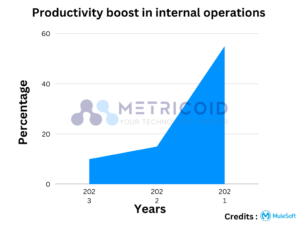Maximizing Collaboration in Logistics Through API Development

The logistics business cannot afford to fall behind in today’s age of continual, quick communication and instant data access. Traditional compartmentalized systems have yielded to the interconnection provided by contemporary technologies. The demand for frictionless communication and data exchange has never been greater, and this is where API Development comes into play. The major goal of this blog is to look into API Development’s transformational role in maximizing collaboration in the logistics sector.
API, which stands for Application Programming Interface, acts as a bridge between different software programmes, allowing them to communicate and exchange data. API development has proven to be a game changer in the logistics business, enabling real-time tracking, better inventory management, and faster decision-making processes.
APIs have ushered in a new era of collaborative logistics by breaking down boundaries between various systems and operations. Let’s take a closer look at what happens next.
Table Of Contents
Streamlining Internal Operations
APIs are critical tools for optimizing internal logistical processes. They enable system integration, which aids in the breakdown of silos and the facilitation of communication. This not only increases efficiency but also guarantees that all aspects of the business are in sync.
APIs, for example, can enable real-time data transmission between an organization’s inventory system and order management system. This guarantees that everyone has access to the most recent inventory information, lowering the risk of overselling and stock-outs. According to a survey conducted by MuleSoft, an API management platform provider, firms who have implemented APIs for internal operations have witnessed a boost in productivity of up to 40%.

Furthermore, APIs enable the automation of manual operations like data input and report production. This not only saves time but also lowers the possibility of mistakes. When these benefits are applied to a big logistics business, the overall impact on efficiency and accuracy may be significant.
To summaries, APIs play an important role in optimizing internal operations in the logistics sector by easing communication, boosting data accuracy, and automating jobs. Companies that engage in API development should expect considerable gains in operational efficiency and effectiveness.
Partner Ecosystem Expansion
APIs are instrumental in expanding the partner ecosystem of logistics firms. With APIs, businesses can seamlessly integrate their systems with partners such as carriers, freight forwarders, customs agencies, and third-party logistics providers (3PLs). The result is a synergistic network where information flows freely, facilitating better coordination, faster response times, and ultimately, more robust supply chains.
Enhanced Customer Experience
APIs enable logistics firms to offer their customers real-time tracking capabilities, thus increasing transparency and trust. Customers can monitor the progress of their shipments at any time, significantly enhancing their experience.
Driving Innovation
APIs enable developers to create new apps that exploit the company’s data and capabilities, opening up a new world of creativity. This implies that logistics companies can constantly improve their digital solutions, providing more value to their clients and remaining ahead of the competition.
Optimized Cost Management
APIs may drastically minimize operational redundancies and mistakes through effective data exchange and cooperation, resulting in cost savings. According to a Cloud Elements poll, 55% of corporate leaders see APIs as crucial to their growth plan, citing the cost savings benefits.
Embracing Predictive Analytics
APIs, when combined with predictive analytics, can pave the way for data-driven decision-making in the logistics sector. Logistic companies can leverage APIs to gather data from various sources and apply predictive analytics to anticipate potential disruptions, optimize routes, manage inventory, and forecast demand more accurately. This proactive approach can significantly boost operational efficiency and help businesses stay one step ahead of potential challenges.
Enabling Secure Data Sharing
APIs also play a crucial role in ensuring secure data sharing. By defining how software components should interact, APIs create secure gateways for data exchange. This is particularly relevant in the logistics industry, where sensitive information, like customer details and proprietary business data, needs to be shared across various platforms. With APIs, businesses can ensure this data is transmitted securely, enhancing trust within their partner ecosystem.
Automating Processes
Automation is another key advantage offered by API development. APIs can streamline and automate several manual tasks in the logistics chain – from order placement and tracking to inventory management and invoicing. By reducing human error and speeding up processes, APIs can significantly boost productivity and operational efficiency.
Building Scalable Solutions
Scalable solutions become increasingly important as logistics organizations develop and their operations become more complicated. APIs enable firms to construct and adjust their digital infrastructure in response to the increasing complexity. They let businesses to add new services, connect with additional partners, and manage growing volumes of data while maintaining system speed. As a result, they pave the path for long-term and scalable expansion.
Fostering Transparency and Accountability
Accountability is essential in the logistics industry. Clients want to know where their goods are at all times, and unexpected delays or losses can jeopardies company ties. APIs may develop a feeling of openness and responsibility by providing real-time tracking and fast changes, therefore increasing client confidence and pleasure.
APIs are reshaping the logistics industry, providing a slew of advantages that go far beyond basic data sharing. APIs are genuinely at the heart of contemporary, collaborative logistics, from automation and predictive analytics to safe data interchange and scalable expansion.
Streamlining Business Processes
APIs are instrumental in streamlining business processes. By allowing disparate systems to interact seamlessly, APIs can minimize manual input and reduce the risk of errors, improving efficiency and accuracy. They can automate tasks such as invoice generation, inventory tracking, and order management, helping logistics companies save time and resources.
Driving Innovation
APIs also drive innovation by making it easier to add new features and services. Logistics companies can use APIs to integrate advanced technologies like AI, IoT, and Blockchain into their operations. For instance, IoT devices can track the condition and location of goods in real-time, and AI can analyze this data to optimize routes and predict potential issues. This ability to quickly adopt and leverage new technologies can give logistics companies a significant competitive advantage.
Enhancing Customer Experience
APIs have the potential to significantly improve the consumer experience in logistics. They offer real-time tracking, fast updates, and seamless communication, all of which can boost customer satisfaction dramatically. APIs may also make it easier for customers to utilize a company’s services by facilitating the integration of customer-facing features such as online booking and digital payments.
Improving Regulatory Compliance
Regulatory compliance is critical in the logistics industry. APIs can help companies reduce compliance costs by automating data gathering and reporting. They can guarantee that businesses have the data they need to demonstrate compliance with industry norms and standards.
API development has enormous promise in logistics. APIs are paving the way for a more efficient, agile, and customer-centric logistics business by promoting cooperation, driving innovation, improving customer experience, and simplifying compliance. While this article has focused on a few major advantages, the possibilities are limitless, making API development a must-have for any logistics firm looking to succeed in the digital era.
In conclusion, API Development is revolutionizing the logistics industry by fostering an unprecedented level of collaboration and communication. By integrating APIs into their operations, logistics companies can ensure they stay competitive in the digital age, delivering enhanced customer experiences and driving growth.






